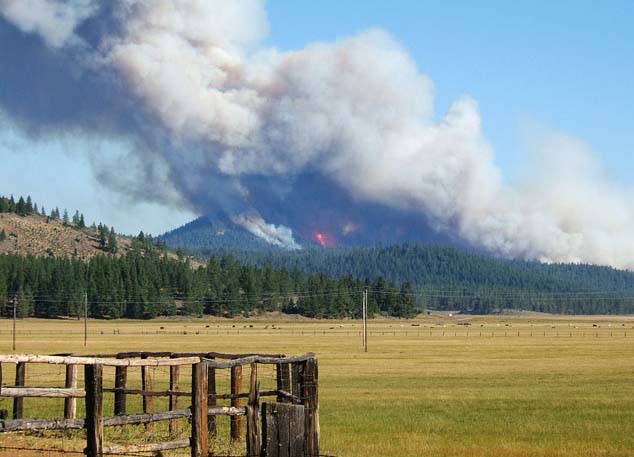
The Moonlight Fire made plenty of news in 2007 as it burned 65,000 acres of U.S. Forest Service and state protected lands in Northern California (map). But since then it has hit the headlines many times with various episodes of a series of scandals that have rocked the wildland fire and judicial systems. In the latest installment the U.S. Supreme court has been asked to hear a case related to the fire.
An investigation conducted by the USFS and the California Department of Forestry and Fire Protection (CAL FIRE) determined that sparks from a dozer working on land owned by Sierra Pacific Industries (SPI), a timber company in California, started the fire. There is a report that an employee in a lookout tower had left to make a one hour round trip to get a soda when the fire started. Upon his return the fire was well established. At another time, someone visiting that tower smelled marijuana and observed the employee peeing on his feet. The explanation for the latter was to treat athlete’s feet.
Based on the results of the investigation, the Department of Justice through the United States Attorney’s Office extracted a $55 million settlement from SPI and a requirement that the company hand over 22,500 acres of land. But SPI has always denied any responsibility for the fire.
As the case wound through the courts both sides (CAL FIRE/USFS/U.S. Attorney vs. SPI) accused the other of unethical conduct, including destroying or withholding evidence.
In 2009 a CAL FIRE investigator asked that a portion of the settlement, $7.7 million, be paid with a separate check so that it could be deposited into an unusual off-the-regular-books non-government account. The WiFiter account used shortcut methods to procure items outside of the conventional appropriations and procurement system. Previously funds in the account had been used for off the books purchases of items such as 600 digital cameras and 26 evidence sheds.
Below are excerpts from a March 30 article in the Washington Post by Kathleen Parker:
…Next came the state case, where evidence of misconduct was so overwhelming that the judge threw out the case, calling the joint investigation and prosecution “corrupt and tainted” and saying that it “threatened the integrity of the judicial process.” He concluded that petitioners could not “ever have received . . . a fair trial,” and awarded SPI $32 million in compensatory sanctions — the largest sanction against a government body in U.S. history.
The Moonlight Fire case is sufficiently fascinating as a multifaceted drama, but it is certainly more than that. Ten state attorneys general have filed an amicus brief urging the Supreme Court to accept the case. Yet, even an outrageous case of prosecutorial misconduct isn’t enough to get the Supreme Court’s review.
This week a book was published about this bizarre saga, “Scorched Worth: A True Story of Destruction, Deceit, and Government Corruption”.
(To read all 10 of the articles we have written about the Moonlight Fire, click HERE.)
Thanks and a tip of the hat go out to Tim.
Typos or errors, report them HERE.
